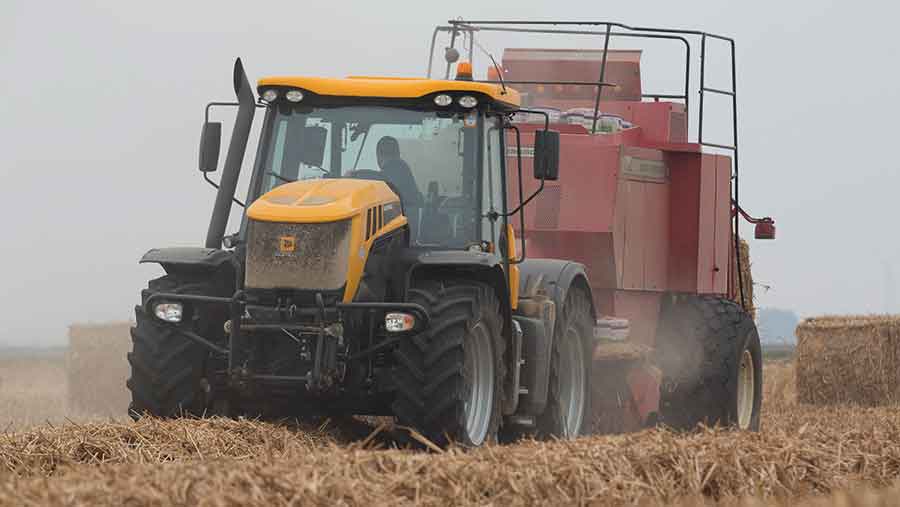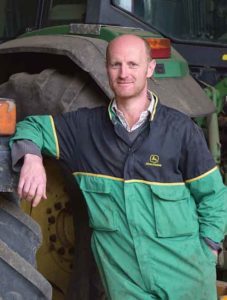Top tips for starting a new farm contracting business

© Tim Scrivener
Starting out in contracting can be daunting and financially terrifying but it can equally create a lifestyle driven by a true love of the outdoors and machinery. Farmers Weekly speaks to three contractors about their experience of setting up a contracting operation and the opportunities and challenges they have faced.
Geoff Simms (40)
 Geoff Simms is a straight-talking, hands-on Hertfordshire contractor who has based his business around whole-farm services.
Geoff Simms is a straight-talking, hands-on Hertfordshire contractor who has based his business around whole-farm services.
Mr Simms returned to the family’s 485ha tenanted farm after leaving Writtle College in 1999, and a year later the company took on its first whole-farm contract agreement. Since then, it has added three more contracts and 525ha to the total stubble-to-stubble operation, alongside a few one-off jobs that come through word of mouth.
See also: NAAC farm contractor charges 2016-17
“Prior to our first whole-farm agreement we bought a new Vaderstad 400 4m drill to help cope with the increased acreage and move away from a totally plough-based system. This gave us more time and capacity to tender for work more competitively,” says Mr Simms.
“We hire in machines when needed and have increased our staff to include one full-time and another for nine months of the year. Alongside family labour and extra seasonal staff this gives us the capacity we need.”
Staff morale is important and Mr Simms is keen to help team members develop and get involved with decision making. He admits that his attitude to work has softened over the years and, while he would have once been pushing for more hours, he now encourages staff to take family time off.
“Fortunately for us, debt collection is not really an issue as clients generally pay quarterly and we are on good terms with our one-off customers too, although regular communication is key in maintaining those relationships.”
Challenges
“The weather is always a challenge and over the past 15 years that has probably caused me the most sleepless nights.
I am also a practical chap and don’t like being in the office. My wife Kate does the accounts but it can be frustrating for her getting all the information out of my head and on to paper and invoices. We are aiming to streamline this process with new software to take some of the reliance away from me.”
Advice to new entrants
“It is not all about chasing the acres. It’s tempting to want to get bigger to maintain economies of scale but diverse contracting operations are important to remove the peaks and troughs from the farming calendar.
Technology is also vital to maximise efficiency and improve the quality of work. GPS is an essential which I could not live without, not to mention the cost, labour and fuel savings that it brings. Google Maps is also great to help direct employees to fields and locations.”
Adrian Riley (33)
 Grit and determination to succeed are what set Adrian Riley on the path of agricultural contracting.
Grit and determination to succeed are what set Adrian Riley on the path of agricultural contracting.
After graduating from Harpers Adams he took a job at the NAAC, but he found it tough to adapt to an office-based role and, after four years, decided to establish Darsdale Farm Contracts with Paul Miller.
Initially, the business relied on Mr Miller doing the work with an old 100hp tractor, mower, tedder, post-knocker and round baler, until sufficient business was lined-up to justify Mr Riley leaving his job.
Getting finance to add a second tractor to the fleet proved difficult, so the pair had to rely on leasing machinery until they had built up sufficient trading history.
The early days proved a rough ride for the business. Just as Mr Riley left the relative security of his NAAC job the gearbox blew in their tractor – two weeks out of warranty – which left the company with a £10,000 bill. At a similar time, a customer failed to pay a big invoice and it left the team questioning their decision to go it alone.
However, the boys refused to give in. They used the experiences to make more prudent decisions, which meant buying all their tractors brand new to fix costs with four-year warranty schemes.
They were also fortunate to have access to 35ha of family grassland that they used to make haylage. It helped pay for new grass kit and eventually allowed them to buy a second Claas tractor for extra drilling work.
It was the purchase of a 360 digger that really changed the business and allowed them to diversify into agricultural and equine groundworks, which now provides a large chunk of their work.
Challenges
“We’ve now got a good employee, but our main challenge has always been getting staff that work to our high standards. In fencing and groundworks, every post knocked in is a business card for us and it has been increasingly hard to get skilled staff who are prepared to put in the manual labour to do a good job.
In the early years, we also struggled to access finance, which made it hard to expand the business.”
Advice to new entrants
“Probably the most important lesson we’ve learnt is how valuable office time is – you have to find time to do the bookwork. This can feel virtually impossible but if you are going to maintain your cashflow – and get paid – the it’s vital. Get online banking, BACS payments, a good accounts package and software that can save you time with invoicing.
Also don’t take on more work than you can cope with. We probably pushed individuals too hard; we now take on extra staff and manage our workload better.
Know your costs and be aware that in the early days new, naive businesses are often offered work by customers that don’t easily pay (and other contractors won’t touch). Be confident to say no if the sums don’t add up.
We have a much better work-life balance now that we have young families. Juggling family time can be hard but we have a company policy that from October to April the team does not work from Saturday lunchtime. This pays dividends as we are all keener to get back to work after a break.”
Matt Redman (28)

© Tim Scrivener
Youthful and ambitious, Bedfordshire-based contractor Matt Redman remains calm about the stresses and strains of running his own business.
“It can be frustrating but I am happy to put in the effort as I don’t want to let people down and I want to build my business.”
Winner of the Farm Sprayer Operator of the Year in 2014, Mr Redman’s new work is mostly based on his local reputation.
“My Twitter account rarely gets me work, but it gives me the chance to speak to experienced contractors and experts in my line of work for help, advice and ideas.”
The family farm was not large enough to accommodate Mr Redman once he has finished his degree at Harper Adams in 2010, so he instead found a job as foreman on a neighbouring farm.
However, he knew he wanted to start his own operation and in 2012, after completing his Basis qualification, he bought his first machine – a Househam AR3000 sprayer.
As with many new entrants, the first two years were tough, so Mr Redman supplemented his income by working for other farmers. At the same time, he saw an opportunity to carve open a niche by buying a 12m Avadex spreader and hiring-in a tractor to carry it.
Though it was initially slow to get off its feet, the workload shot from 40ha of Avadex application in 2012 to over 4,000ha in 2015. It meant investing in an extra 24m Kuhn Aero machine and second tractor, which subsequently allowed the business to carry out a wider range of work with the extra horsepower.
With the Avadex job nailed down, Mr Redman was looking for the next specialist opportunity and decided to invest in a 3m John Deere 750a direct drill in 2014. The planter has since been upgraded to a 6m version for spring 2016, and the Househam sprayer has also replaced by a larger Bateman RB35 to give the spraying service more flexibility, capacity and technology.
Challenges
“I find it very hard to find experienced staff that are prepared to take on seasonal work. I may be too picky but in this line of work each operator needs to be suitably skilled.”
“Filling the gaps between peak periods can also be a challenge when building a business, as investment has to be focused on the main services.”
Advice to new entrants
“Make sure your costs are carefully calculated and be realistic about your planned work. It is better to underestimate your workload and take a more measured approach. My business has grown at a faster rate than I planned, but my goals are being quickly readjusted to try and ensure it heads in the right direction.”
AG CAREERS LIVE
Talk directly to employers, get careers advice or find a job in agriculture at Farmers Weekly’s Ag Careers Live on 10 November at the Ricoh Arena, Coventry.
If you are a student, graduate or just looking for your next job, our national event can help you progress your career. For further information, and to register for free, go online to www.fwi.co.uk/agcareerslive

